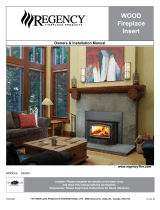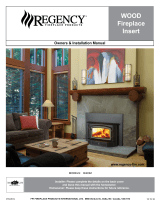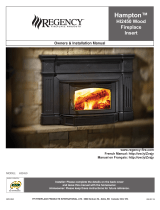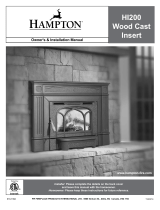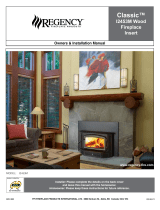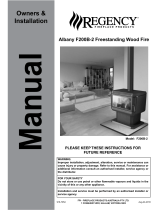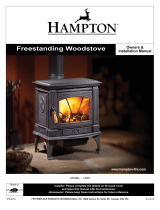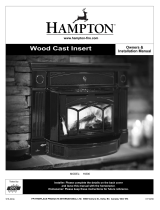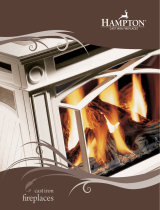Page is loading ...

FPI FIREPLACE PRODUCTS INTERNATIONAL LTD. 6988 Venture St., Delta, BC Canada, V4G 1H4
919-544c
MODEL: HI300
03.11.19
Installer: Please complete the details on the back cover
and leave this manual with the homeowner.
Homeowner: Please keep these instructions for future reference.
Tested by:
Wood Cast Insert
Owners &
Installation Manual
www.hampton-re.com
French Manual: http://ow.ly/ZvwLL
Manuel en Français: http://ow.ly/ZvwLL

2 | Hampton HI300 Wood Cast Insert
|
2
Thank-you for purchasing a HAMPTON PRODUCT.
The pride of workmanship that goes into each of our products will give you years of trouble-free enjoyment. Should you have any questions about your product
that are not covered in this manual, please contact the HAMPTON DEALER in your area. Keep those HAMPTON FIRES burning.
“This wood heater has a manufacturer set minimum low burn rate that must not be altered. It is against federal regulations to alter this setting or otherwise
operate this wood heater in a manner inconsistent with operating instructions in this manual." Failure to follow the manual details can lead to smoke and CO
emissions spilling into the home. It is recommended to have monitors in areas that are expected to generate CO such as heater fuelling areas.
“U.S. ENVIRONMENTAL PROTECTION AGENCY Certied to comply with 2015 particulate emission standards using crib wood". Not approved for sale after
May 15, 2020.”
Model Regency HI300 – 3.4 g /hr.
SAFETY NOTE: If this woodstove is not properly installed, a house re may result. For your safety, follow the installation instructions, contact local building,
re ocials, or authority having jurisdiction about restrictions and installation inspection requirements in your area.
The following statements are required by the Environmental Protection Agency:
“This manual describes the installation and operation of the Regency HI300 wood heater. This heater meets the 2015 U.S.Environmental Protection Agency’s
crib wood emission limits for wood heaters. Under specic test conditions this heater has been shown to deliver heat at rates ranging from 12,000 BTU/hr. to
36,800 BTU/hr.” This unit has been tested using 5G series and generates the best eciency when operated using well-seasoned wood and installed in the
main living areas where the majority of the chimney is within the building envelope and fully lined.”
"It is against federal regulation to operate this wood heater in a manner inconsistent with operating instructions in this manual, or if any parts are removed. “
It is against federal regulation to operate this wood heater in a manner inconsistent with operating instructions in this manual.
CAUTION: BURN UNTREATED WOOD ONLY. OTHER MATERIALS SUCH AS WOOD PRESERVATIVES, METAL FOILS, COAL,
PLASTIC, GARBAGE, SULPHUR OR OIL MAY DAMAGE THE HEATER
"This heater is designed to burn natural wood only. Higher eciencies and lower emissions generally result when burning air dried seasoned hardwoods, as
compared to softwoods or to green or freshly cut hardwoods."
DO NOT BURN:
• Treated wood
• Lawn clippings or yard waste • Manure or animal remains
• Coal
• Materials containing rubber including tires • Saltwater driftwood or other previously salt water
saturated materials
• Garbage
• Materials containing plastic • Unseasoned wood
• Cardboard
• Waste petroleum products , paints or paint thinners or asphalt products • Paper products, cardboard, plywood or particle
board. The prohibition against burning these
materials does not prohibit the use of fire starters
made from paper, cardboard, saw dust, wax and
similar substances for the purpose of starting a
fire in a wood heater
• Solvents
• Materials containing asbestos
• Colored Paper
• Construction or demolition debris
• Trash
• Railroad ties
Burning these materials may result in release of toxic fumes or render the heater ineective and cause smoke.
The authority having jurisdiction (such as Municipal Building Department, Fire Department, Fire Prevention Bureau, etc.) should be consulted before installa-
tion to determine the need to obtain a permit.
This unit must be connected to either a listed factory built chimney suitable for use with solid fuels and conforming to ULC629 in Canada or UL-103HT in the
United States of America or code approved masonry chimney with ue liner.
HI300 is tested and certied to ULC-S628 and UL1482
SAVE THESE INSTRUCTIONS

Hampton HI300 Wood Cast Insert | 3
3
|
table of contents
SAFETY LABEL
Safety Label For Hi300 .................................................. 4
UNIT DIMENSIONS
with standard .................................................................5
Cast faceplate................................................................5
with oversize .................................................................. 6
Cast faceplate................................................................6
INSTALLATION
Before Installing Your Insert...........................................7
Chimney Specications .................................................7
Wood Insert Specications ............................................7
Masonry And Factory Built Fireplace Clearances .........8
How To Determine If Alternate
Floor Protection Materials Are Acceptable.....................8
Installing Your Insert ......................................................9
Optional Flue Connector Kit ..........................................9
Flue Connector Bracket ................................................. 9
Installation Into A Masonry Fireplace ........................... 10
Installation Into A Factory Built Fireplace.....................10
Stainless steel smoke deector
adjustment / replacement ............................................ 11
Standard Cast Faceplate Installation...........................12
Oversize Cast Faceplate Installation ...........................15
Cast grill installation.....................................................18
Fan Installation ............................................................19
Power Outlet conversion .............................................20
Firebrick Assembly ......................................................22
Flue Bae & Secondary Air Tube Installation .............22
Draft Control ................................................................22
OPERATING INSTRUCTIONS
Seasoned Firewood.....................................................23
Safety Guidelines ........................................................24
First Fire ......................................................................24
Creosote ......................................................................25
Ash Disposal................................................................25
Fan Operation .............................................................25
Wood Storage ..............................................................25
Door Gasket ................................................................26
Glass Cleaning ............................................................26
Door Removal..............................................................26
Glass Replacement .....................................................26
HandleReplacement ....................................................26
Latch Adjustment .........................................................27
PARTS
Main Assembly ............................................................29
Standard Cast Faceplate ............................................. 30
Oversize Cast Faceplate .............................................31
Brick Panels.................................................................32
WARRANTY
Warranty ......................................................................34

4 | Hampton HI300 Wood Cast Insert
|
4
safety decal
This is a copy of the label that accompanies
your Hampton Insert. We have printed a copy
of the contents here for your review.
NOTE: Hampton units are constantly being
improved. Check the label on the unit and if
there is a dierence, the label on the unit is
the correct one.
SAFETY LABEL FOR HI300
Part #: 918-241d
Colour: Black on grey, except for selected items which are printed red.
Size: 15.75" W x 2" H (File at 100%)
Aug. 20/08: Revision B
LISTED FACTORY BUILT FIREPL ACE INSERT
CERTIFIED FOR USE IN CANADA AND U.S.A.
MODEL: HI300
TESTED TO:
ULC S628- 93 / UL
1482
REPORT NO. 219-S-03-2
DO NOT REMOVE THIS LABEL
264
COMPONENTS REQUIRED FOR INSTALLA TION: 5.5” (140mm) or 6” (152MM) STAINLESS LINER
DANGER: RISK OF ELECTRIC SHOCK. DISCONNECT POWER BEFORE SERVICING UNIT. DO NOT ROUTE POWER CORD UNDER OR IN FRONT
OF APPLIANCE. DO NOT CONNECT THIS UNIT TO A CHIMNEY FLUE SERVICING ANOTHER APPLIANCE.
DO NOT REMOVE BRICKS OR MORTAR IN MASONRY FIREPLACE. FOR USE WITH SOLID WOOD FUEL ONLY. DO NOT USE GRATE OR ELEVATE
FIRE. BUILD WOOD FIRE DIRECTLY ON HEARTH. OPERATE WITH FEED DOOR CLOSED, OPEN TO FEED FIRE ONLY. REPLACE GLASS ONLY
WITH CERAMIC GLASS (5MM). INSPECT AND CLEAN CHIMNEY FREQUENTLY. UNDER CERTAIN CONDITIONS OF USE CREOSOTE BUILDUP
MAY OCCUR RAPIDLY. DO NOT OVERFIRE, IF INSERT GLOWS YOU ARE OVER-FIRING.
MINIMUM CLEARANCES TO COMBUST IBLE MATERIA
LS (MEASURED FROM INSERT BODY)
INSTALL ONLY ON A NON-COMBUSTIBLE HEARTH RAISED (F) 0.5IN / 13MM
ABOVE AN ADJACENT COMBUSTIBLE FLOOR. COMBUSTIBLE FLOOR MUST
BE PROTECTED BY NON-COMBUSTIBLE MA
TERIAL EXTENDING
(E) 18 IN / 457MM
TO FRONT
AND (G) 8 IN / 205MM
TO SIDES FROM
FUEL DOOR. 0.5” FLOOR PROTECTION NEEDS TO BE WITH K = 0.84.
918-241d
MANUFACTURED BY:
FPI FIREPLACE PRODUCTS INTERNATIONAL LTD.
6988 VENTURE ST.
DELTA, BC V4G 1H4
HOT WHILE IN OPERATION
DO NOT TOUCH. KEEP CHILDREN,
CLOTHING AND FURNITURE AWAY.
CONTACT MAY CAUSE SKIN BURNS .
READ ABOVE INSTRUCTIONS.
CAUTION
ADJACENT
SIDEWALL A) 11 in / 280mm
MANTLE B)
20in / 510mm
TOP FACING C 12in / 355 mm
SIDE F
ACING
D) 8in
/ 185mm
INST
ALL AND USE ONLY IN ACCORDANCE WITH THE MANUFACTURER'S INSTALLATION AND
OPERATING INSTRUCTIONS. INSTALL AND USE ONLY
IN MASONR
Y
FIREPLACE OR F
ACTORY BUILT FIREPLACE.
CONT
ACT LOCAL
BUILDING OR FIRE OFFICIALS
ABOUT RESTRICTIONS AND INSTALLA TION INSPECTION IN YOUR AREA.
UNITED STATES ENVIRONMENTAL PROTECTION
AGENCY CERTIFIED TO COMPLY WITH JULY 1990,
PARTICULATE EMISSION STANDARD S.
JAN
FEB MAR APR MAY
JU
N
JUL
AUG SEPT OCT NOV DEC
2017 2018 2019
(Duplicate
Serial #)
MADE IN CANADA
264
DATE OF
MANUFACTURE
Mar. 1/10: Updated Logo
Apr. 7/11 : Added 5.5” stainless liner/ Update man. dates.
Oct. 3/13: Rev. C - Updated yrs of manufacture
Apr. 29/16: Rev D - Updated yrs of manufacture 2017-2021
2020 2021

Hampton HI300 Wood Cast Insert | 5
5
|
dimensions
17-1/4”
9”
11-1/8”
11-3/8”
8-1/2"
21-1/2”
30”
30-7/8"
23-1/4”
23-3/4”
42-1/2”
41”
40”
7-3/4”
NOTE:
Before assembling your Insert,
use these dimensions to ensure
appropriate clearances will be
met (refer to Masonry and Fac-
tory Built Fireplace Clearances
section).
WITH STANDARD
CAST FACEPLATE

6 | Hampton HI300 Wood Cast Insert
|
6
dimensions
NOTE:
Before assembling your Insert, use
these dimensions to ensure appro-
priate clearances will be met (refer to
Masonry and Factory Built Fireplace
Clearances section).
WITH OVERSIZE
CAST FACEPLATE
ALL PICTURES / DIAGRAMS SHOWN THROUGHOUT THIS MANUAL ARE FOR ILLUSTRATION PURPOSES ONLY.
ACTUAL PRODUCT MAY VARY DUE TO PRODUCT ENHANCEMENTS.

Hampton HI300 Wood Cast Insert | 7
7
|
installation
CHIMNEY
SPECIFICATIONS
Before installing, check and clean your chimney
system thoroughly. If in doubt about its condi-
tion, seek professional advice. Your Hampton
Insert is designed for installation into a masonry
replace that is constructed in accordance with
the requirements of "The Standard for Chimneys,
Fireplaces, Vents, and Solid Fuel Burning Ap-
pliance", N.F.P.A. 211, the National Building
Code of Canada, or the applicable local code
requirements.
The appliance, when installed, must be electri-
cally grounded in accordance with local codes or,
in the absence of local codes, with the National
Electrical Code, ANSI/NFPA 70, or the Canadian
Electrical code, CSA C22.1.
Hampton Inserts are designed to use either a
5.5" (140mm) or 6" (152mm) ue.
Requirements for Installing
Solid-fuel Inserts in Factory-built
Fireplaces.
1) The insert must be tested and meet the
requirements of UL 1482 (U.S.) and or ULC
S628 (Canada) when tested in a masonry
replace built per ULC S628.
2) The factory-built replace must be listed per
UL 127 or ULC S610.
3) Clearances obtained from the masonry re-
place tests are also relevant for installation
in factory-built replaces.
4) Installation must include a full height listed
chimney liner type HT requirements (2100
degree F.) per UL 1777 (U.S.) or ULC
S635 (Canada). The liner must be securely
attached to the insert ue collar and the
chimney top.
5) Means must be provided to prevent room
air passage to the chimney cavity of the
replace. This may be accomplished by
sealing the damper area around the chimney
liner, or sealing the replace front.
6) Alteration of the replace in any manner is
not permitted with the following exceptions;
a. external trim pieces which do not aect
the operation of the replace may be
removed providing they can be stored
on or within the replace for re-assembly
if the insert is removed.
b. the chimney damper may be removed
to install the chimney liner.
Hampton Inserts are constructed with the high-
est quality materials and assembled under strict
quality control procedures that insure years of
trouble free and reliable performance.
It is important that you read this manual thor-
oughly and fully understand the safe instal-
lation and operating procedures. The more
you understand the way your Hampton Insert
operates, the more enjoyment you will experi-
ence from knowing that your unit is operating
at peak performance.
BEFORE INSTALLING
YOUR INSERT
1) Please read this entire manual before
you install and use your new wood insert.
Failure to follow instructions may result
in property damage, bodily injury or even
death. Install and use only in accordance
with manufacturer’s installation and operat-
ing instructions.
2) Check your local building codes - Building
Inspection Department. You may require
a permit before installing your insert. Be
aware that local codes and regulations may
override some items in the manual.
WARNING: Careless installation is the
major cause of safety hazard. Check all
local building and safety codes before
installation of unit.
3) Notify your home insurance company that
you plan to install a replace insert.
4) Your replace insert is heavy and requires
two or more people to move it safely. The
insert can be badly damaged by mishan-
dling.
5) If your existing replace damper control
will become inaccessible once you have
installed your Hampton Insert, you should
either remove or secure it in the open posi-
tion.
6) Inspect your replace and chimney prior
to installing your insert to determine that it
is free from cracks, loose mortar or other
signs of damage. If repairs are required,
they should be completed before installing
your insert. Do not remove bricks or mortar
from your masonry replace.
7) Do not connect the insert to a chimney
system servicing another appliance or
an air distribution duct.
7) Circulating air chambers (i.e. in a steel
replace liner or metal heat circulator) shall
not be blocked.
8) Means must be provided for removal of the
insert to clean the chimney ue.
9) Inserts that project in front of the replace
must be supplied with appropriate support-
ing means.
10) Installer must mechanically attach the sup-
plied label to the inside of the rebox of the
replace into which the insert is installed.
In order for a solid-fuel insert to be certied for use
in factory-built replaces, the above information
must be clearly stated in the installation manual
and appropriate markings. Final approval is
contingent on the authority having jurisdiction.
WOOD INSERT
SPECIFICATIONS
Your replace opening requires the
following minimum sizes:
Height 21.5"
Width 25"
Depth 17.5"
"WARNING: This replace has been converted
for use with a wood insert only and cannot be
used for burning wood or solid fuels unless
all original parts have been replaced, and the
replace re-approved by the authority having
jurisdiction."
Important:
The blower to this appliance must be turned
o anytime the fuel door is opened. Prior to
turning the blower back on, ensure there are no
embers near the blower which may have fallen
onto the hearth when the fuel door was opened.
Once the fuel door is closed, the blower may
be turned back on.

8 | Hampton HI300 Wood Cast Insert
|
8
installation
Clearance Diagram for Installations
Side and Top facing is a maximum of 1.5" thick.
Floor protection must be non-combustible, insula-
tive material with an R value of 1.1 or greater.
* Hearth thickness of 0.5" with k value = 0.84",
r value = 0.6 or greater.
Thermal oor protection not required if unit is
raised 3.5" min. measured from bottom of stove. At
this point the standard ember oor protection will
be required. It will need to be a non-combustible
material that covers 16" (406 mm) to the front
of the unit (in Canada 18" (450 mm) and 8" (200
mm) to the sides.
All oor protection must be non-combustible (i.e.,
metals, brick, stone, mineral ber boards, etc.) Any
organic materials (i.e. plastics, wood paper prod-
ucts, etc.) are combustible and must not be used.
The oor protection specied includes some form
of thermal designation such as R-value (thermal
resistance) or k-factor (thermal conductivity).
** A non-combustible mantel may be installed
at a lower height if the framing is made of
metal studs covered with a non-combustible
board.
** Max. mantle depth is 10" (254mm)
MASONRY AND FACTORY BUILT FIREPLACE CLEARANCES
The minimum required clearances to combustible materials when installed into a masonry or factory built replace are listed below.
Minimum Hearth Extension for the front (E) and sides
(G) are measured from the fuel door opening.
HOW TO DETERMINE IF ALTERNATE
FLOOR PROTECTION MATERIALS ARE ACCEPTABLE
The specied oor protector should be 3/8"
(18mm) thick material with a K - factor of
0.84.
The proposed alternative is 4" (100mm) brick
with a C-factor of 1.25 over 1/8" (3mm) mineral
board with a K-factor of 0.29.
Step (a):
Use formula above to convert specication
to R-value.
R = 1/k x T = 1/0.84 x .75 = 0.893.
Step (b):
Calculate R of proposed system.
4" brick of C = 1.25, therefore
Rbrick = 1/C = 1/1.25 = 0.80
1/8" mineral board of k = 0.29, therefore
Rmin.bd. = 1/0.29 x 0.125 = 0.431
Total R = Rbrick + Rmineral board =
0.8 + 0.431 = 1.231.
Step (c):
Compare proposed system R of 1.231 to
specied R of 0.893. Since proposed system
R is greater than required, the system is
acceptable.
DEFINITIONS
Thermal Conductance:
C = Btu = W
(hr)(ft
2
)(
o
F) (m
2)
)(K)
Thermal Conductivity:
k = (Btu)(inch) = W = Btu
(hr)(ft
3
)(
o
F) (m)(K) (hr)(ft)(
o
F)
Thermal Resistance:
R = (ft
2
)(hr)(
o
F) = (m
2
)(K)
Btu W
A
B
C
D
G
F
E
H
Unit
Adjacent
Side Wall
(to Side of Unit)
A
Mantle**
(to Top of
unit)
B
Top
Facing
(to Top of Unit)
C
Side
Facing
(to Side of Unit)
D
Minimum
Hearth
Extension
E
Minimum
Hearth
Thickness*
F
Minimum
Hearth
Extension
Side
G
From Top of
Unit
H
Wood Cast
Insert (HI300)
11"/280mm 20"/508mm
12"/305mm Reg. F/P
14"/356mm O/S F/P
8"/200mm Reg. F/P
11"/279mm O/S F/P
18"/455mm 0.5"/13mm 8"/200mm 21-1/2"/546mm

Hampton HI300 Wood Cast Insert | 9
9
|
installation
FLUE CONNECTOR
BRACKET
Package contains: 3 brackets and 6 screws.
These brackets are to be used to hold the ue liner (not supplied) to
the Insert and keep the connection. The brackets are screwed into
the top of the Insert in the pre-punched holes and then screwed
into the ue liner.
OPTIONAL FLUE
CONNECTOR KIT
The Straight Flue Adaptor (Part #846-504) shown here, may be
used to produce a secure connection between your ue connector
and the insert collar. Detailed installation instructions are included
with the kit.
Your insert is very heavy and will require two or three people to
move it into position.
1) Remove the Door to make the insert easier to handle. To remove
the Door, open fully and lift it up o its hinges.
Refer to the Door Removal section for an important note on installa-
tion.
Left Side
Cast
Right Side
Cast
Ashlip
3) Lift the unit up onto the Hearth and slide into the replace opening.
Be sure to leave the unit out at least 3 to 4 inches in order to make
the necessary ue connections and to install the faceplate.
Be sure to protect your hearth extension during the installation,
ie. with a heavy blanket.
Door
Hinges
DO NOT LIFT UNIT FROM THESE PARTS.
INSTALLING YOUR INSERT
WARNING
DO NOT LIFT OR PUSH THE UNIT FROM THE
ASHLIP, LEFT SIDE CAST or RIGHT SIDE CAST.
THE CASTING WILL CHIP OR BREAK.
STOP! PLEASE READ CAREFULLY.
CAST COMPONENTS ARE VERY FRAGILE.
USE EXTREME CARE WHEN HANDLING.
2) NOTE: For Masonry installation make sure that the rebox is level
with the hearth using non-combustible materials and no more than
1/2 to 1 inch of the levelling bolt.

10 | Hampton HI300 Wood Cast Insert
|
10
installation
1) Positive Flue
Connection
with Cleanout
2) Direct Flue
Connection
with Cleanout
3a) Full Flue Liner
(No Cleanout Required)
Note: A clean-out door is sometimes required, by your inspector,
to be installed when either the Positive ue connection or
Direct ue connection method is used.
The use of one of the connection methods listed on this page not only
increases the safety of your insert by directing the hot gases up the ue,
but will also help increase the unit's eciency and decrease creosote
deposits in the chimney.
When a connected ue or liner is in use, the insert is able to “breathe”
better by allowing a greater draft to be created. The greater draft can
decrease problems such as, dicult start-ups, smoking out the door,
and dirty glass.
INSTALLATION INTO A
MASONRY FIREPLACE
The insert must be installed as per the requirements of your local in-
spection authority. While a full liner is preferred, three methods of ue
connection are acceptable in most areas in the US, however in Canada
a full ue liner is required.
1) Positive ue connection, where a large blocking plate and a short
connector pipe is used.
2) Direct ue connection, where a smaller blocking plate and a connector
pipe to the rst ue liner tile is used.
3) Full ue liner, where a stainless steel rigid or exible liner pipe is
routed from the insert outlet collar to the top of the chimney.
Hampton highly recommends the use of a full liner as the safest installa-
tion and provides the most optimum performance. Your retailer should
be able to help you decide which system would be the best for your
application.
1) When installed in a factory built replace, a full stainless steel rigid
or exible ue liner is mandatory, for both safety and performance
purposes. When a ue or liner is in use, the insert is able to breathe
better by allowing a greater draft to be created. The greater draft
can decrease problems such as, dicult start-ups, smoking out
the door, and dirty glass.
2) In order to position the ue liner, the existing rain cap must be
removed from your chimney system. In most cases the ue damper
should also be removed to allow passage of the liner.
3) In most cases opening the existing spark screens fully should give
enough room for the insert installation. If it does not, remove and
store.
4) If the oor of your replace is below the level of the replace open-
ing, adjust the insert's levelling bolts to accommodate the dier-
ence. When additional shimming is required, use non-combustible
masonry or steel shims.
5) Measure approximately the alignment of the ue liner with the
position of the smoke outlet hole on the insert to check for pos-
sible oset. If an oset is required, use a proper stainless steel
unit available with the chimney liner.
6) Once the above items have been checked, slide your insert into
position after rst positioning the ue liner and oset if required.
(Re-install raincap at completion of installation).
NOTE: See requirements for installing solid fuel
inserts in factory built replaces.
INSTALLATION INTO A
FACTORY BUILT FIREPLACE
Draft is the force which moves air from the appliance up through the
chimney. The amount of draft in your chimney depends on the length
of the chimney, local geography, nearby obstructions and other fac-
tors. Too much draft may cause excessive temperatures in the appli-
ance and may cause damage. An uncontrollable burn or excessive
temperature indicates excessive draft. Inadequate draft may cause
back pung into the room and plugging of the chimney. Inadequate
draft will cause the appliance to leak smoke into the room through
appliance and chimney connector joints. Ensure the heater is installed
in areas that are not too close to neighbors or in valleys that would
cause unhealthy air quality or nuisance conditions.

Hampton HI300 Wood Cast Insert | 11
11
|
installation
STAINLESS STEEL SMOKE DEFLECTOR ADJUSTMENT / REPLACEMENT
The stainless smoke deflector is located in the upper front area of the firebox. The deflector is held in place with 2 bolts
Prior to the first fire, ensure deflector is seated properly and secured with 2 hand tightened bolts.
To replace the deflector, loosen off both bolts and slide defector upward and out. Install new defector and hand tighten bolts. Ensure positive location of
the deflector prior to hand tightening.
WARNING: Operation of the unit with out proper installation of smoke deflector will void warranty.
Smoke deector installed with 2 bolts.
Note: This is a view from the back of the unit
through the top.
Ensure defector is seated so bolts are situated
at the top of the keyhole before tightening.
Hand tighten bolts only.
Smoke deector

12 | Hampton HI300 Wood Cast Insert
|
12
installation
STANDARD CAST FACEPLATE
INSTALLATION
12/23/10
918-300g
HI300
CAST FACEPLATE
INSTALLATION
Page 1 of 3
1) Secure the Side Mounting Brackets (packaged with Faceplate)
to the left and right side of the fi rebox using 4 bolts per mounting
bracket as shown in the diagram below.
Side
Mounting
Bracket
Backside of Unit Shown.
Backside of Unit & Faceplate Shown.
2) Secure the Left and Right Side Faceplate to the fi rebox by align-
ing the Mounting Holes with the Side Mounting Brackets taking
care to align vertically while each side rests on the hearth. Secure
using 1 bolt per bracket.
Side Mounting
Bracket
Mounting
Hole
Right Side
Faceplate
Left Side
Faceplate
3) Place Mantel Top onto the top of the fi rebox.
Mantel Top
Right Side
Cast
With the Mantel Top in place check to make sure there is no gap
between the nut retainer and the underside cast of the Mantel
Top. If there is a gap present you will need to lower that side cast
by loosening 2 bolts, see step 6 for bolt location (check to see if
level).
FACEPLATE CONTENTS LIST
Qty Description
1
Left Side Faceplate
1
Right Side Faceplate
1
Top Faceplate
2
Side Mounting Brackets
4
1/4" - 20 x 1/2" Hex Head Bolts
4
1/4" Lock Washers
4
1/4" Flat Washers
2
47" Insulations

Hampton HI300 Wood Cast Insert | 13
13
|
installation
12/23/10
918-300g
HI300
CAST FACEPLATE
INSTALLATION
Page 2 of 3
4) Slowly slide the Mantel Top forward until it stops.
Slide Mantel
Top
5) Mount the Top Faceplate by carefully sliding the Mounting Plates
on the Left and Right Side Faceplate thru the Retainers in the
Top Faceplate.
NOTE: Slowly lower the Top Faceplate into position; being careful
not to damage the Mantel Top.
Backside of Unit & Faceplate Shown.
Retainer
Mounting Plates
Top Faceplate
Cast
adjustment
bolts
Cast
mounting
bolts
for height
adustment.
Right Side
Faceplate
Left Side
Faceplate
7) Carefully slide the Mantel Top back into position.
See Step 3 to identify side casts.
See next page for recommended measurements.
Slide Mantel
Top back.
6) If unable to align side faceplate to unit and top
faceplate further adjustments need to be made, complete
one side at a time. Loosen all bolts on brackets (6 per side).
Loosen top and bottom bolts (Shown below).
Adjust left or right side cast plates to allow further adjustment
on faceplate. Once aligned, hold side surround in place and
tighten all bolts. If side cast height needs adjusting, loosen 2
bolts holding cast bracket and adjust up or down.

14 | Hampton HI300 Wood Cast Insert
|
14
installation
12/23/10
918-300g
HI300
CAST FACEPLATE
INSTALLATION
8) Location of Insulation:
a) Place 1 piece of Insulation behind the Mantel Top.
b) Cut the second piece of Insulation in half, then install behind both
the Left and Right Sides as shown.
9)
The unit may now carefully be slid into fi nal position.
Insulation
Rear View of Unit
RECOMMENDED MEASUREMENTS
FOR SETTING SIDE CASTS
Stop! Read Carefully.
Enamel & Cast components are very fragile.
Use extreme care when handling.
Right Side
Cast
Left Side
Cast
1/4" (approx.) between both
sides of door and cast.
Ashlip
1/8" - 1/4" (approx.) for both sides,
between ashlip and bottom of side cast.
4-1/2" - 4-3/4" boths sides rear inside edge to fi rebox.
Important: Verify gap between cast and door did not
change when rear adjustments have been made.
Carefully open door slowly, to ensure that the door does
not rub against cast sides.
*
These are just recommended measurements.
Page 3 of 3

Hampton HI300 Wood Cast Insert | 15
15
|
installation
918-967
05/02/11
1
HI300
OVERSIZE CAST FACEPLATE INSTALLATION
Stop! Read Carefully.
Enamel & Cast components are very fragile. Use extreme care when handling.
1) Secure the Side Mounting Brackets (packaged with Faceplate) to the
left and right side of the fi rebox using 2 bolts per mounting bracket
as shown in the diagram below. Bolts are pre-installed on unit.
Leave bolts loose until fi nal adjustment is made.
Side Mounting
Bracket
Backside of Unit Shown.
Backside of Unit & Faceplate Shown.
2) Secure the Left and Right Side Faceplate to the fi rebox by aligning
the Mounting Holes with the Side Mounting Brackets taking care to
align vertically while each side rests on the hearth. Secure using 2
bolts per bracket.
Side Mounting
Bracket
Mounting
Hole
Right Side Face-
plate
Left Side Face-
plate
3) Place 1/4" x 1" Hex head bolt with 2 washers in Mantel Top Spacer
locations shown below.
4) Place Mantel Top onto the top of the fi rebox.
Mantel Top
Mantel Top Spacer
Right Side
Cast
With the Mantel Top in place check to make sure there is no gap
between the Mantel To p Spacer and the underside cast of the Mantel
Top. If there is a gap present you will need to lower that side cast by
loosening 2 bolts, see side cast adjustment section for bolt location
(check to see if level).
FACEPLATE CONTENTS LIST
Qty Description
Left Side Faceplate
Right Side Faceplate
Top Faceplate
Side Mounting Brackets
1/4" - 20 x Hex Nuts
1/4" - 20 x 1" Hex Head Bolts
1/4" Flat Washers
47" Insulations
mm gsket
OVERSIZE CAST FACEPLATE INSTALLATION

16 | Hampton HI300 Wood Cast Insert
|
16
installation
918-967 05/02/11
2
HI300
6) Place supplied gasket to bottom edge of top faceplate - continue
gasket up each side at a 45° angle.
7) Mount the Top Faceplate by carefully sliding the Mounting Plates on
the Left and Right Side Faceplate through the Retainers in the Top
Faceplate.
NOTE: Slowly lower the Top Faceplate into position; being careful
not to damage the Mantel Top.
Backside of Unit & Faceplate Shown.
NOTE: Installing the top faceplate will require 2 people - it is
heavy and awkward to handle.
Retainer
Mounting Plates
Gasket Location
Top Faceplate
Right Side Face-
plate
Left Side Faceplate
8) Carefully slide the Mantel Top back into position.
Slide Mantel
Top back.
9) Adjust Left Side Faceplate and tighten bolts. Repeat step for Right
Side Faceplate.
10) Location of Insulation:
a) Place 1 piece of Insulation behind the Mantel Top.
b) Cut the second piece of Insulation in half, then install behind both
the Left and Right Sides as shown.
11) The unit may now carefully be slid into fi nal position.
See side cast adjustments if faceplate needs aligning.
Insulation
5) Slowly slide the Mantel Top forward until it stops.
Slide Mantel Top

Hampton HI300 Wood Cast Insert | 17
17
|
installation
918-967
05/02/11
3
HI300
Cast
adjustment
bolts
Cast
mounting
bolts
for height
adjustment.
See Step 1 to identify side casts.
See next section for recommended measurements.
If unable to align side faceplate to unit and top
faceplate further adjustments need to be made,
complete one
side at a time. Loosen all bolts on brackets (6 per side). Loosen
top and bottom bolts (Shown below).
Adjust left or right side cast plates to allow further adjustment on
faceplate. Once aligned, hold side surround in place and tighten
all bolts. If side cast height needs adjusting, loosen 2
bolts holding
cast bracket and adjust up or down.
Rear View of Unit
RECOMMENDED MEASUREMENTS
FOR SETTING SIDE CASTS
SIDE CAST ADJUSTMENTS
Stop! Read Carefully.
Enamel & Cast components are very fragile.
Use extreme care when handling.
Right Side
Cast
Left Side
Cast
1/4" (approx.) between both
sides of door and cast.
Ashlip
1/8" - 1/4" (approx.) for both sides,
between ashlip and bottom of side cast.
4-1/2" - 4-3/4" boths sides rear inside edge to fi rebox.
Important: Verify gap between cast and door did not
change when rear adjustments have been made.
Carefully open door slowly, to ensure that the door does
not rub against cast sides.
*
These are just recommended measurements.

18 | Hampton HI300 Wood Cast Insert
|
18
installation
CAST GRILL INSTALLATION
919-151
04/19/12
1
HI300
GLASS REMOVAL TO INSTALL
OPTIONAL DOOR CAST GRILL
1. To remove the glass, loosen the two 7/16" bottom retainer
bolts but do not remove.
2. Remove the sides and top retainer and bolts highlighted in the
diagram and carefully remove glass, it will fall towards you
at the top.
3. Place the grill in the door, make sure that the glass gasketing
on the left and right bracket is facing you.
4. Carefully place the glass (black strip up) into the bottom re-
tainer. Keeping it in place, re-install the sides and top retainer
and bolts. Do not tighten bolts, nger tight only.
5. Lift the bottom of the glass upwards till it stops, secure glass
retainer using the 8 bolts. Do not wrench down on the bolts,
as this may cause the glass to break.
Remove 6 - 7/16" Bolts
Avoid impact on glass doors such
as striking or slamming shut.
CAST GRILL HI300
(300-981 Cast Black) / (300-985 Enamel Brown)

Hampton HI300 Wood Cast Insert | 19
19
|
installation
Backside of Fan Facia Shown.
Your fan should only be installed once the unit is in place in order
to prevent any damage to the fan.
1) Attach the Left and Right Side Fan Facia to the Front Fan
Facia by aligning the Side Facia screw slots with the hole
locations in the Front Fan Facia and secure using 2 screws
per side.
FAN INSTALLATION
3) Ensure the power cord and all other wires will not come into
contact with any hot stove surfaces.
DO NOT ROUTE POWER CORD UNDER
OR IN FRONT OF UNIT.
Do not turn the fan ON until your insert has reached operating
temperature or at least 30 minutes after starting re.
Right Side
Fan Facia
Left Side Fan
Facia
Front Fan
Facia
2) Once the Fan Facia has been assembled carefully slide the
Fan into position by centering the Fan below the Ashlip and
align the Fan Support Clips with the Oset Clips under the
Ashlip.
Note: The Draft Control Rod is to t through the top open-
ing in the Switch Plate.
IMPORTANT
Ensure that the Left and Right Side Fan Facia do not
hit the sides of the Faceplate when sliding the Fan into
position as the casting may chip.
If the spacing between the Side Fan Facia and the Face-
plate requires adjustment, the Side Fan Facia's can be
slightly pushed in or pulled out to t accordingly.
Ashlip
Draft Control
Rod
Switch
Plate
Fan
Support Clips
Ground
Fan Fan
Ground
Green
Neutral
Live
White
Fan
Switch
Manual/
Auto
Switch
Black Black
High (Black)
Low (Red)
Black
Fan Thermodisc
(normally open)
120V AC
60 Hz
Blower/Fan Wiring Diagram
Installer: Please record unit serial number here before installing blower.
Serial No.______________________________

20 | Hampton HI300 Wood Cast Insert
|
20
installation
07/23/08
918-378
HI300
POWER OUTLET CONVERSION
1) Remove the Phillips screw, located on the top of the
fan housing, which attaches the fan defl ector to the
main fan body.
2) Take off the 2 screws from the fan switch plate as-
sembly, and remove it from the left casting face.
3) Take off the 2 bolts, nuts, and washers from the
thermodisc assembly, and remove it from the main
fan body. Retain the screws for reattachment on the
other side.
4) Remove the green ground wire from the left side of
the fan motor, by detaching the phillips screw. Keep
the screw to reattach the green ground wire on the
other side.
5) Raising the fan defl ector, pull the wire harness, switch
plate, ground wire and thermodisc assembly from
the left side and relocate to the right side of the main
fan housing. See step 10 for Thermodisc Assembly
installation.
Important Note:
The wire harness may be tight between the fan motor
and main body but will move over and down to the
base with a little fl exing of the fan motor. Ensure the
wire harness rests on the base when pulled over.
6) Remove the 2x 7/16" bolts from the right casting.
Discard the existing casting plate and attach the
new casting plate with the switch plate assembly.
7) Remove the top black screw from the leg on the
right side of the fan motor, and attach the screw to
the leg on the left side.
bolts
Fan Housing
Fan Switch
Plate Assembly
Thermodisc
Assembly
Right Side Leg
Existing Casting Plate
8) Attach the green ground wire with the #8 x 3/8" Pan
Head Phillips steel self tapping screw, previously
removed from the left side.
POWER OUTLET CONVERSION
/

